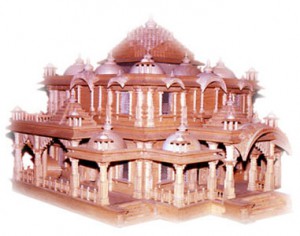Gujarat has been a gateway of commerce and culture between the East and the West and is one of the oldest civilizations on the earth. Dwarka is one of four most scared pilgrimage centers (Chardham) of Hindu faith and is associated with Lord Krishna’s life. The main giant ornate shrine is situated on the western most tip of saurastra. According to the epic Mahabharata, the city in due course was submerged by the sea. The submergence of Dwarka and the cause of submergence are of historical and oceanographic interest because of historic Dwarka is likely to throw light on the Dark Age of Indian history.
 Ornate, exquisite and majestic, Dwarkadhish Temple (Jagat Mandir) is one of the most imposing five- storied structures of Hindu architecture in Gujarat on the confluence of river Gomti and Arabian sea. The five-storey high temple is built on seventy-two pillars. The temple spire is 78.3m high. From the temple dome waves an eighty-four foot long multicolored flag decorated with the symbols of the sun and moon. Lord Krishna’s grandson, Vajranabha, is said to have built the original temple of Dwarkadhish over the hari-griha (Lord Krishna’s residential place).
Ornate, exquisite and majestic, Dwarkadhish Temple (Jagat Mandir) is one of the most imposing five- storied structures of Hindu architecture in Gujarat on the confluence of river Gomti and Arabian sea. The five-storey high temple is built on seventy-two pillars. The temple spire is 78.3m high. From the temple dome waves an eighty-four foot long multicolored flag decorated with the symbols of the sun and moon. Lord Krishna’s grandson, Vajranabha, is said to have built the original temple of Dwarkadhish over the hari-griha (Lord Krishna’s residential place).
The sanctum of the temple is formed by the Jagat Mandir, or Nija Mandir, which dates back at least 2500 years. The Jagat Mandir has a tall tower and a hall of audience. There are two entrances to the temple. The main entrance (north entrance) is called “Moksha Dwara” (Door to Salvation). This entrance leads to the main market. The south entrance is called “Swarga Dwara” (Gate to Heaven). Outside this doorway are 56 steps that lead to the Gomati River.